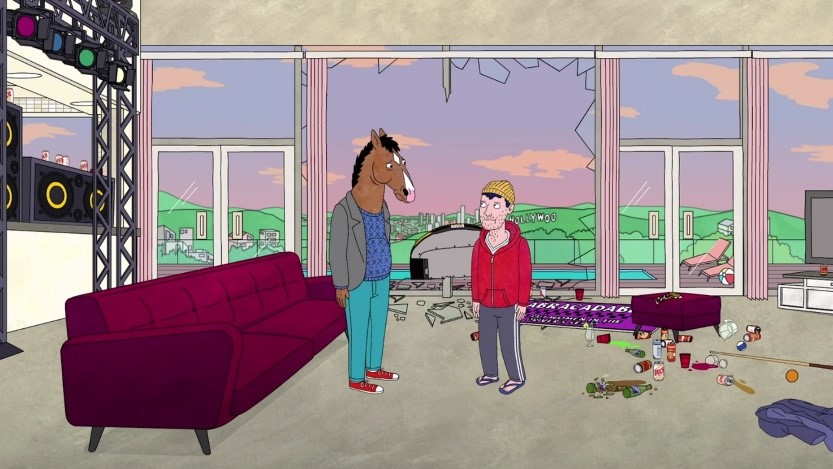WHY BOJACK HORSEMAN IS ONE OF MODERN MEDIA’S GREATEST PORTRAYALS OF MENTAL HEALTH
By Senan Karunadhara
This article was written before the release of ‘BoJack Horseman the Final Season Part 2.’
VERY MINOR SPOILERS
With the growth of the awareness of mental illness in the modern-age came the growth in the number of pieces of modern media attempting, and often failing, to depict mental health in a realistic way. After having to endure the sorry attempts by Netflix’s 13 Reasons Why at exploring such a complex issue, often romanticising suicide and depression, television begged for a show that was able to explore the human psyche in a realistic, grounded and relatable way. Ironically, just that came in the form of another Netflix original, BoJack Horseman, and thus a cartoon comedy centred around a horse, became one of my favourite shows and the best portrayal of human mental illness I have ever seen.
This show is built on the simple premise of a washed-up star of a hit television show living in Hollywood, or Hollywoo as its known in the show.
Before I delve into the topic of this article, I feel as though it is important to note that BoJack Horseman is a fantastic show in general. Times Arrow, an episode that explores the past through the flashbacks of a woman suffering from dementia, and Free Churro, an episode that is simply a 22-minute monologue from BoJack, are two of the greatest episodes of television I have ever had the pleasure of experiencing. Every episode, every character, is written with thought, care and depth, and though initially it may seem unnecessary, every set-up pays off in spades. It is by no means a perfect show, and it certainly is not for everyone, but it succeeds in what it sets out to do.
What makes this show such a fantastic portrayal of mental illness is that its characters are not defined by the fact that they have a mental illness. In many pieces of media, characters with mental illnesses are caricatures, when you take away the fact that a character has a mental illness, you are left with nothing. By comparison, no character in BoJack Horseman is defined by their mental health, they are three-dimensional characters who happen to have mental illnesses, thus when these illnesses are put in the forefront of the plot, they not only feel natural but also incredibly realistic. The penultimate episode of each season is known for causing the viewer to just pause after the final credits roll and have their own mini-existential crisis…it’s great fun, and occurs because the writers are able to create a realistic and grounded portrayal of self-destructive mental illness.
Furthermore, the show does not simply explore depression and act as though it has covered every single type of mental illness. It is difficult to find shows that go beyond depression, but BoJack Horseman is one of them. BoJack (Will Arnett) suffers from the belief that he is not worthy of love, he plunges himself in escapist self-destructive behaviour and attempts to avoid any deep connection with those around him out of the fear that he will inevitably hurt them…which he often does, but he still needs to be told that he has the capacity to be a good person. Princess Carolyn (Amy Sedaris) is the workaholic unable to find fulfilment. Mr Peanutbutter (Paul F. Tompkins) is, “So stupid, he doesn’t realise how miserable he should be.” Diane (Alison Brie) is a cynic, who falls victim to her own self-loathing. Todd (Aaron Paul) is…Todd. Mental illness is portrayed exactly how it exists, as multifarious and multifaceted in both nature, intensity and manifestation.
Finally, there is no one discernible cause for why each of the characters suffer from what they do. Childhoods, jobs, marriages, relationships, responsibilities, expectations and so much more slowly start to eat at each characters’ mental stability. All of these factors become not only the bedrock of mental illnesses but also what characters consider to be worthy excuses for their actions. This show does not portray poor mental health as an excuse for terrible behaviour or an easily traceable phenomenon, as it comes to the revelation that, “You are all the things that are wrong with you,” and that you are the one who needs to help yourself.
This article has only covered the tip of the iceberg about what makes this show such a brilliant representation of mental health. BoJack Horseman is realistic, it’s bold and does not shy away from portraying a grounded interpretation of the human psyche out of fear that its viewers would become too uncomfortable. I really do implore any reader to give this show a try, it’s funny when it needs to be and the writing is nothing short of masterful. My advice would be not to give up after the first half of season 1, it’s an understandably slow, yet worthwhile burn and after that the show kicks into high gear and becomes a non-stop rollercoaster. In my opinion, this will go down as one of the greatest shows of our generation, and I will be genuinely sad to see it end next January.



